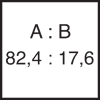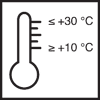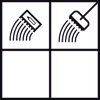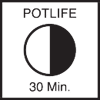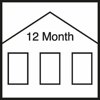Article No. 680211
Tough coating
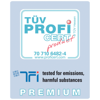
Product specifications
Component A
Component B
Mixture
Once fully cured
* Synthetic resin mortar 1 : 5 with standard sand
The stated values represent typical product characteristics and are not to be construed as binding product specifications.
Field of application
- Polyurethane coating in systems approved by the DIBt (German Institute for Structural Engineering) for recreation rooms (AbZ Z-156.605-1487)
Properties
- Tough coating
- With static crack-bridging ability
- Can be subjected to mechanical loads
- Can be subjected to chemical loads
- Suitable for hand pallet trucks and forklift trucks
- Physiologically harmless once fully cured
-
Preparation
-
Substrate requirements
The substrate must be firm, dimensionally stable, capable of bearing loads and free of loose constituents, dust, oil, grease, rubber marks and other substances that could interfere with adhesion.
The substrate must be dry.
The adhesive pull strength of the surface after priming must be at least 1.5 N/mm² on average (smallest single value min. 1.0 N/mm²), compressive strength at least 25 N/mm².
Suitable Remmers Epoxy primers or Epoxy scratch coats must be used on cement substrates.
Refer to the current Technical Data Sheet for detailed information on the single products.
Prime interior poured asphalt surfaces (AS-IC 10 or AS-IC 15) with PUR Uni Color.
For works within the framework of the general building inspectorate approval, the substrates must correspond to the requirements of the approval and the system products mentioned therein must be used.
-
Preparations
In the case of interior poured asphalt surfaces, take suitable measures to prepare the substrate, e.g. steel ball blasting or grinding with a diamond disc, in order to meet the requirements listed above.
Then prime and/or level out with PUR Uni Color.
-
-
Preparation
-
Combination container
Add the entire quantity of the hardener (component B) to the base compound (component A).
Mix thoroughly with a slow-speed electric mixer
(approx. 300 - 400 rpm).Pour the mixture into a separate container and mix again thoroughly.
Mix for at least 3 minutes.
Insufficient mixing is indicated by streaks forming.
-
Application
-
Application requirements
Temperature of the material, air and substrate: from min. +10 °C to max. +30 °C
-
Temperature Foot traffic after +8 °C 48 hours +12 °C 30 hours +20 °C 16 hours As a general principle, higher temperatures will reduce and lower temperatures will increase the times stated.
-
Working tools / cleaning
-
Toothed trowel, toothed scraper, rubber scraper, epoxy roller, suitable mixing apparatus
-
More detailed information can be found in the Remmers Tool Programme.
Clean tools, equipment and splashed material immediately while fresh with V 101.
Take suitable protective and waste disposal measures when cleaning.
-
Storage / shelf life
-
If stored unopened in its original container in a cool, dry place and protected against frost, the product will keep for at least 12 months.
-
Usage
-
See application examples
-
-
Application examples
-
Application Level of filling with Selectmix 01/03 Binder application rate [kg/m²] Mixture application rate [kg/m²] Toothed blade Application rate per mm layer thickness [kg/m²] Coating < 1 mm unfilled 0.8 - 1.0 0.8 - 1.0 No. 5 Coating approx. 1 mm unfilled 1.2 - 1.5 1.2 - 1.5 No. 7 1.45 Filled coating 1 : 0.3 min. 1.2 min. 1.6 No. 25 1.60 Filled coating 1 : 0.5 min. 1.5 min. 2.3 No. 46 1.70 -
P
Pour the material liberally onto the poured asphalt surface. Spread using a suitable tool, e.g. a rubber scraper, then roll using an epoxy roller.
approx. 0.5 kg/m² binder (depending on the substrate)
-
LLRC
Pour the material filled up to 1 : 0.3 parts by weight onto the prepared surface and spread using a suitable trowel.
(see table)
-
C
Pour the material onto the prepared substrate and then distribute using a suitable tool, e.g. a notched trowel or notched scraper.
The application rate depends on the substrate, temperature, required coating thickness, and optical requirements.
(see table)
-
FC
Pour the material filled with Selectmix 01/03 on the previously prepared surface and distribute with a suitable toothed trowel/spreader and, if needed, roll over with a spiked roller.
The degree of filling must be chosen depending on substrate, temperature and required layer thickness.
(see table)
-
-
General information
-
Unless otherwise specified, all of the values and application rates given above have been determined under laboratory conditions (20 °C) using standard colours. Slight deviations from these values may arise if the product is worked with on site.
When coating continuous surfaces, only use materials with the same batch number as slight differences in colour, gloss and texture may occur.
Owing to the tendency to yellow, the possible colour deviations, and the reaction to soiling, it is highly recommended to apply a suitable coloured Remmers seal coat.
Special colours, low layer thickness or differing sand fractions as well as lower temperatures can reduce the maximum degree of filling of the material and possibly affect the visual appearance of the surface.
In case of repairs on the surface or working up to existing surfaces, there will be a visible transition in appearance and texture.
Abrasive mechanical loads leave traces of wear.
Exposure to vehicles with metal or polyamide tyres as well as dynamic concentrated loads can cause faster wearing of the coating.
Further notes on working, system construction and maintenance of the listed products can be found in the latest Technical Data Sheets and the Remmers system recommendations.
-
-
Disposal instructions
-
Larger quantities of leftover product should be disposed of in the original containers in accordance with the applicable regulations. Completely empty, clean containers should be recycled. Do not dispose of together with household waste. Do not allow to enter the sewage system. Do not empty into drains.
-
-
Safety / regulations
-
For professional users only!
Further information concerning safety during transport, storage and handling as well as on disposal and ecology can be found in the latest Safety Data Sheet.
-






